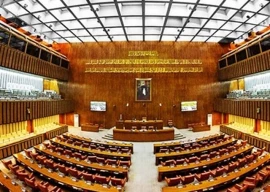
Chief Justice of Pakistan (CJP) Yahya Afridi on Thursday expressed concern over the backlog of cases in the anti-terrorism courts (ATCs) across Pakistan, emphasising the need to expedite these cases to ensure the timely dispensation of justice.
The top judge chaired a meeting of the Administrative Judges of ATCs at the Supreme Court.
The meeting reviewed the performance of ATCs and took stock of key challenges to ensure the swift and efficient dispensation of justice in anti-terrorism cases.
The session was attended by Supreme Court monitoring judges Justice Jamal Khan Mandokhail (via video link), Justice Muhammad Ali Mazhar, Justice Musarrat Hilali and Justice Malik Shahzad Ahmad Khan - as well as ATC monitoring judges and prosecutors general from all provinces and the Islamabad Capital Territory.
The apex court registrar and the Law and Justice Commission secretary were also in attendance.
The chief justice welcomed participants and outlined the session's aim to assess the status and performance of ATC cases, while identifying and addressing obstacles to the swift delivery of justice.
He reminded participants of the immense responsibility they carry in dispensing justice, urging them to uphold the law impartially and without fear or favour.
During the meeting, it was disclosed that a total of 2,273 ATC cases are currently pending in the country with a significant portion - 1,372 cases - awaiting resolution in Sindh alone.
The chief justice expressed concern over the backlog, emphasizing the need to expedite these cases to ensure justice is not delayed.
The meeting discussed key challenges facing ATCs, including ensuring adequate security for witnesses, facilitating online witness appearances, establishing and enhancing forensic science laboratories to support evidence-based decisions and creating additional ATCs to manage high caseloads effectively.
The chief justice issued specific directions for the Sindh Forensic Science Laboratory to assist Balochistan in operationalising such labs in Quetta. He further directed that ATC judges completing their terms be accommodated on soft positions.
He further announced that high-performing ATC judges should be given opportunities for foreign training with the support of the Law and Justice Commission.
The chief justice directed the attorney general for Pakistan along with the prosecutors general of each province to raise these issues with their respective governments.
He called for swift and coordinated action to address the infrastructure and resource needs of ATCs, which are crucial for ensuring timely and fair outcomes in anti-terrorism cases.
Sources maintained that the backlog of cases before Punjab ATCs stands at 385. Out of these, challans have been submitted in 185 cases whereas incomplete challans have been submitted in 198 cases.
Tax cases
Expressing concern over the adverse effects of delayed tax litigation on judicial efficiency and national revenue, Chief Justice Yahya Afridi launches an initiative at the apex court to resolve longstanding tax cases, said a statement issued by the Supreme Court.
Chief Justice Afridi chaired a high-level strategic meeting at the Supreme Court, which was attended by senior government functionaries, parliamentarians, Supreme Court officials, tax experts, industrialists and representatives of the key trade bodies.
The chief justice highlighted the huge backlog of fiscal cases pending before various judicial forums, particularly in the Supreme Court, where 3,496 cases involving revenue of Rs97 billion were pending for adjudication, the statement said.
"Emphasizing the need for realistic actions, Afridi stressed the importance of swift resolution of this huge backlog. He also asked stakeholders to take steps to stop needless fiscal litigation before the Supreme Court, as most fiscal matters need not be challenged at this level," the statement said.
The chief justice stressed the need for curtailing the practice of prolonging the tax cases through unnecessary stays and adjournments. He emphasised that resolving the massive backlog of tax cases required collaborative and unified efforts.
"All stakeholders including the government and bar need to join hands and play an active role in addressing this problem of huge backlog of fiscal cases," the press release quoted the chief justice as saying. He invited recommendations for to achieve "the goal of swift resolution" of fiscal matters.
The chief justice also emphasised the use of Alternative Dispute Resolution (ADR) mechanisms in fiscal cases. On the occasion, the Law and Justice Commission of Pakistan (LJCP) secretary presented a framework for a 'resolution strategy' to optimise resolution of fiscal cases.
Key components of the strategy included stakeholders' engagements, structured measures to enhance the efficacy of tax case resolution in fiscal cases and formation of a high-level committee, according to the statement.
The terms of reference (ToRs) proposed for the committee were to evaluate current practices, integrate successful global strategies, employ ADR methods, engage key stakeholders, enhance Federal Board of Revenue's (FBR) legal capabilities and finalise TORS to guide efficient resolution of tax cases.
As a result, the chief justice constituted a committee to drive justice sector reforms for efficient fiscal case resolution, which comprised Supreme Court Registrar Muhammad Salim Khan, tax experts Asim Zulfiqar Ali and Imtiaz Ahmed Khan, and a senior FBR representative.
The committee would receive support from Attorney General for Pakistan (AGP) Mansoor Usman Awan and the finance secretary. Another tax expert, Sher Shah Khan, would serve as committee coordinator, according to the statement.
The committee would make recommendations for the justice sector reforms for swift resolution of fiscal cases that would include categorisation of fiscal cases, backlog reduction, reduce the time lag from the initial stage of the case to appellate stage.
"The initiative to prioritise fiscal cases promises to bring much-needed efficiency to Pakistan's judicial system, supporting economic growth and effective revenue collection," the statement said.
The meeting was attended by top officials including chairman, of the FBR, the secretaries of the law and the finance divisions, tax experts, industrialists, representatives of the Federation of Pakistan Chambers of Commerce and Industry (FPCCI) and the Overseas Investors Chamber of Commerce and Industry (OICCI), Senator Saleem Mandiwala and Senator Mohsin Aziz.
Meanwhile, the Chief Justice of Pakistan has initiated diagnostic study for design and execution of short and medium-term strategic interventions following his commitment to improve deliver and access to justice.
A dedicated team of professionals from various fields, with passion to work pro bono, has undertaken functional assessment of the available resources, effectiveness of existing court processes and systems and the challenges and opportunities.
This exercise will be followed by finalization of a workable reform plan with time-lines and impact assessment mechanism, said a press release.
The proposed reform interventions focus on reduction of cases backlog, improved accessibility and transparency through simplification of processes, technological integration and public centric approach, by exploiting the available resources and the existing legal framework. Prioritization of cases involving marginalized segments of the society and high impact cases would be the key feature of the reform interventions.
Stakeholders' engagement, throughout the design and implementation process is being taken care of. Initially, professionals from diverse backgrounds, court staff and other key players of justice sector, including Bar, are being involved for meaningful input. The draft strategic plan would be put to public debate and feedback before its finalization.



-(14)1720679028-0/(image-blakelively-on-Instagram)-(14)1720679028-0-165x106.webp)

1731028448-0/Untitled-design-(37)1731028448-0-165x106.webp)












COMMENTS
Comments are moderated and generally will be posted if they are on-topic and not abusive.
For more information, please see our Comments FAQ